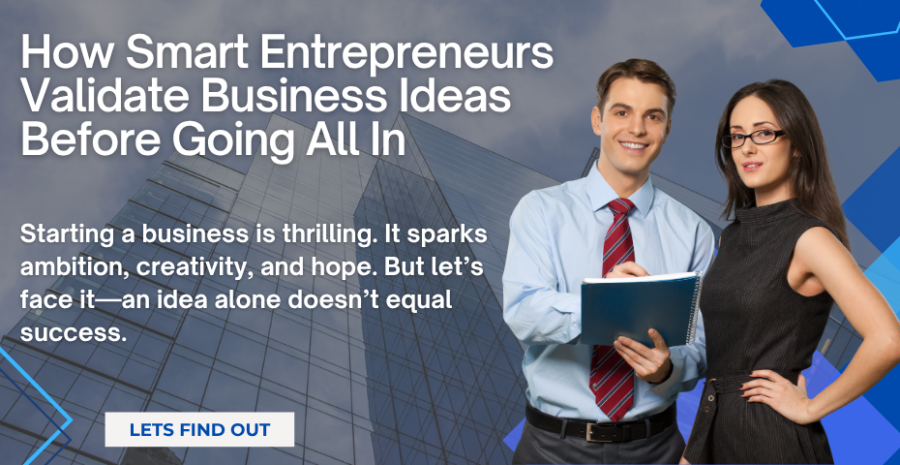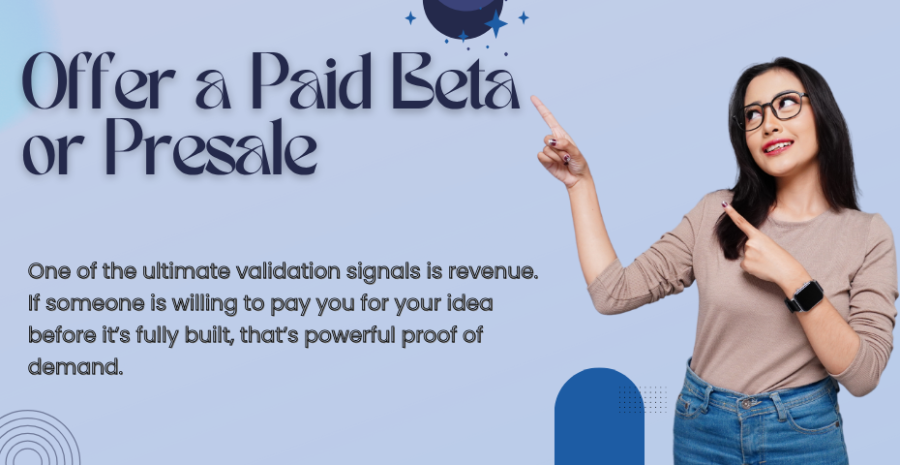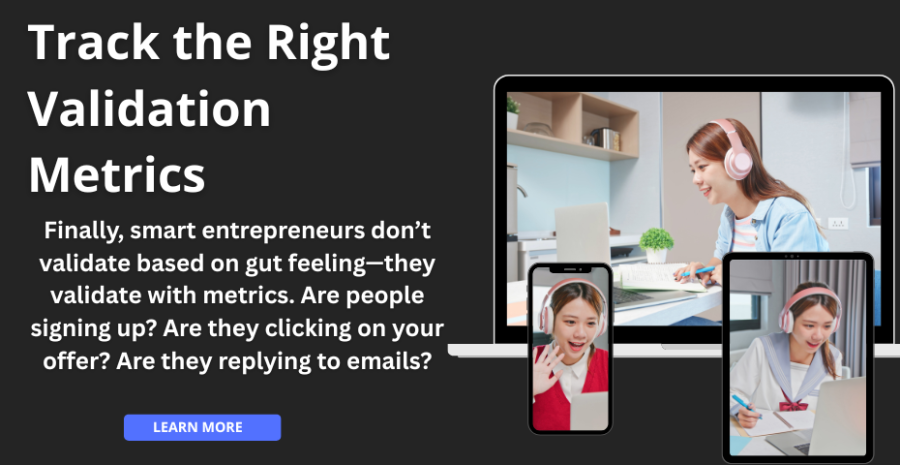

Starting a business is thrilling. It sparks ambition, creativity, and hope. But let’s face it—an idea alone doesn’t equal success. In fact, countless brilliant ideas never make it past the starting line, not because they weren’t clever, but because they lacked validation.
Smart entrepreneurs understand that validation isn’t just a step in the process—it’s the foundation of everything. It’s how you find out if there’s a real need for what you’re offering, who it’s for, and whether people will pay for it. Before investing months of effort and thousands in resources, validation helps you minimize risk and maximize your chances of success.
Many aspiring founders fall into the trap of assuming that because they love their idea, others will too. They spend time designing logos, building websites, and creating full products—without ever talking to a single potential customer.
The result? Products nobody wants or understands. Smart entrepreneurs flip the process: they test first, build later. They know that success isn’t just about innovation—it’s about solving a real problem for real people.
Validation isn’t about perfection; it’s about proof. Proof that your audience exists. Proof that your solution matters. Proof that people will pay. By validating early, you learn faster, pivot smarter, and save yourself from costly detours. It’s the difference between launching with confidence and flying blind.
In this blog, we’ll break down 8 powerful ways smart entrepreneurs validate business ideas before committing fully.
Whether you’re starting a side hustle, building a tech startup, or launching a service, these strategies will help you turn assumptions into insights and dreams into decisions.
Let’s dive in.

Validation starts with conversations—not code, not branding, and definitely not assumptions. Talk to the people you think your product or service is for.
Ask them open-ended questions about their problems, pain points, habits, and frustrations. What are they currently using? What’s missing? Would they pay for a better solution?
Smart entrepreneurs know that true insight comes from listening, not guessing. Use interviews, surveys, or even casual conversations to gather qualitative data.
Don’t pitch your idea yet—just listen and learn. These early discussions reveal whether your problem is real and urgent, and whether your audience actually wants what you’re building.
If you can’t find people interested enough to talk about the problem, that’s a red flag.

No business exists in a vacuum. If there’s no competition at all, that might be a sign that there’s no real demand.
Smart entrepreneurs study the landscape to see who’s already solving the problem—and how. Look at direct competitors, indirect alternatives, and even similar business models in other markets.
Analyze their strengths, weaknesses, pricing, customer reviews, and marketing strategies. This helps you understand market gaps and opportunities to differentiate.
You’re not just validating that a market exists—you’re looking for your unique angle.
Validation means confirming that customers are already spending money to solve this problem and figuring out how you can serve them better or differently.
.png)
An MVP is the simplest version of your idea that delivers value to customers. It’s not a full-featured product—it’s a lean prototype that lets you test demand with minimal investment.
This could be a landing page, a single service, a beta version of an app, or even a Google Doc with pricing and details.
The goal is to get something in front of users quickly so you can observe behavior, collect feedback, and iterate.
Smart entrepreneurs don’t fall in love with their first draft. They use MVPs to validate features, pricing, messaging, and user interest.
Done right, your MVP will attract early adopters, prove traction, and guide future development.

Before spending time and money developing your offer, gauge interest by building a pre-launch list.
Create a simple landing page that explains your concept and includes a strong call to action—like “Join the Waitlist” or “Be the First to Try It.”
Then drive targeted traffic to it via social media, communities, or small ad campaigns. Track how many people sign up and how engaged they are.
Smart entrepreneurs know that email sign-ups are a strong signal of intent, especially when people give their email in exchange for early access. It’s a low-cost way to validate interest and build anticipation.
The bigger the waitlist, the more confidence you can have before launching.

One of the ultimate validation signals is revenue. If someone is willing to pay you for your idea before it’s fully built, that’s powerful proof of demand.
Launch a paid beta version or offer presale pricing to early adopters. Make it clear what they’ll receive, when, and what’s still in development.
You’ll not only validate your pricing model, but also attract your most engaged customers—the ones willing to invest in the outcome.
Smart entrepreneurs use paid pilots to test delivery, get testimonials, and create urgency.
Money talks, and nothing validates like a transaction.

Paid ads aren’t just for selling—they’re great for testing. Smart entrepreneurs use small ad budgets on platforms like Markethive, Facebook, Google, or Instagram to drive traffic to their MVP or landing page.
This lets you see how people respond to your messaging, offer, and positioning. Do they click? Do they convert? Which headlines perform best?
By testing variations of your value proposition in a live market, you can refine your pitch, target the right audience, and gauge real-world interest.
Even $50 in ad spend can give you valuable data on whether your business idea is worth pursuing further.

Post about your idea in relevant online communities, forums, and social platforms. Gauge reactions, questions, shares, and comments.
Are people excited, skeptical, or indifferent? Smart entrepreneurs pay attention to engagement metrics: how many people sign up, ask for more information, or share the idea with others.
Positive reactions can indicate product-market fit, while silence might signal it needs tweaking. Use polls, quizzes, and feedback forms to encourage interaction.
The more people who show interest or express a desire to buy, the more confidence you can have in moving forward.
Social proof helps you build momentum and refine your offer based on what people actually respond to.

Finally, smart entrepreneurs don’t validate based on gut feeling—they validate with metrics. Are people signing up? Are they clicking on your offer? Are they replying to emails?
Are they opening your prototype or visiting your landing page multiple times? Define the success criteria for each validation step: maybe 100 email signups, 10 paying beta users, or a 20% conversion rate on a presale.
Track everything: conversion rates, bounce rates, click-throughs, and retention. These numbers will guide your decision-making and help you avoid emotional overinvestment in an unproven idea.
Metrics don’t lie—and they make your next step clear.
Great businesses don’t start with guesses. They start with evidence. Smart entrepreneurs understand that validation isn’t a barrier to launching—it’s the path to launching smarter, faster, and with fewer regrets.
By testing your idea before going all in, you reduce risk, sharpen your vision, and ensure you’re solving a real problem for real people. It saves you time, money, and heartache—and gives you the confidence that your business isn’t just a passion project, but a proven opportunity.
Whether you use interviews, MVPs, ads, or presales, the key is to take action early and test often. Don’t wait until your product is perfect—start with what’s enough to learn. The insights you gain will guide every next step, from development to marketing to scaling.
Validation isn’t about doubting your dream—it’s about building it on solid ground. So before you dive headfirst into your next big idea, take a moment to validate it first.
Your future business will thank you.
The choice is yours—make it count.
....................................................................................................................................................................................................
About: Andries vanTonder
Over 46 years selfemployed
He is a Serial Entrepreneur, an Enthusiastic supporter of Blockchain Technology and a Cryptocurrency Investor
Find me: Markethive Profile Page | My Twitter Account | My Instagram Acount | and my Facebook Profile.
